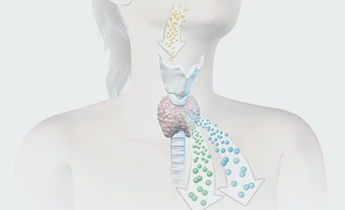 As we are not able to produce selenium in our bodies, we have to get this element from our food and from supplements. The selenium we absorb will then be incorporated into the amino acid selenocysteine.
As we are not able to produce selenium in our bodies, we have to get this element from our food and from supplements. The selenium we absorb will then be incorporated into the amino acid selenocysteine.
Proportionally, there is more selenium in the thyroid gland than in any other organ in the body. One of the reasons for the high selenium content in the thyroid gland is the thyroid hormone production requiring selenium. The thyroid produces a protein called thyroglobulin, which connects iodine and tyrosine to form the thyroid hormone called T4. However, T4, is not biologically active. T4 is activated and deactivated by various enzymes that all require selenium to function. The active thyroid hormone is called T3.
This process generates a lot of free radicals in the form of hydrogen peroxide, which need to be neutralized in order not to damage the thyroid and its hormone production.
Selenium is also a part of antioxidant enzymes, which deactivate these free radicals. Consequently, when we lack selenium, optimal amounts of selenium-containing antioxidant enzymes are not formed, thereby damaging the thyroid and reducing hormone production.
The Thyroid Gland
The thyroid gland is a butterfly-shaped organ located in the base of the neck. A well functioning thyroid gland is important for our survival and well-being as the thyroid hormones control the metabolism of all cellular activity in the body. The more thyroid hormones that get secreted, the faster the metabolism.
There is a huge difference between the selenium content of the agricultural soil in the various US states, and there is also a large difference in the selenium content in crops, depending on where they were grown.
Are Recommended Selenium Allowances Sufficient?
The Recommended Dietary Allowances (RDA) for Selenium is only 55 µg in the US, but research suggests that in many cases there is a need for higher dosages to saturate the most critical selenoproteins and optimize the selenium-dependent functions in the body.
Selenium Deficiency
Maintaining an optimal concentration of selenium is a prerequisite to prevent thyroid disease and preserve overall health. For example, a selenium deficiency may negatively impact the thyroid function, which thereby markedly decreases the activity of thyroid related functions in the liver, kidneys and muscles and drop by maybe 50 percent in the thyroid gland and brain.
Organic Forms of Selenium are more Effective
For people with a selenium deficiency, supplementing with the organic form of selenium is more effective, because the body's ability to absorb the supplement is nearly identical with the absorption levels of selenium from food. People with autoimmune thyroid disease seem to benefit from selenium supplements in immunological mechanisms.
Refs.
Wu Q, et al. Low Population Selenium Status Is Associated with Increased Prevalence of Thyroid Disease. J Clin Endocrinol Metab. 2015;100(11):4037-47.
Ventura M, et al. Selenium and Thyroid Disease: From Pathophysiology to Treatment. International Journal of Endocrinology Vol. 2017 (2017), Article ID 1297658,
